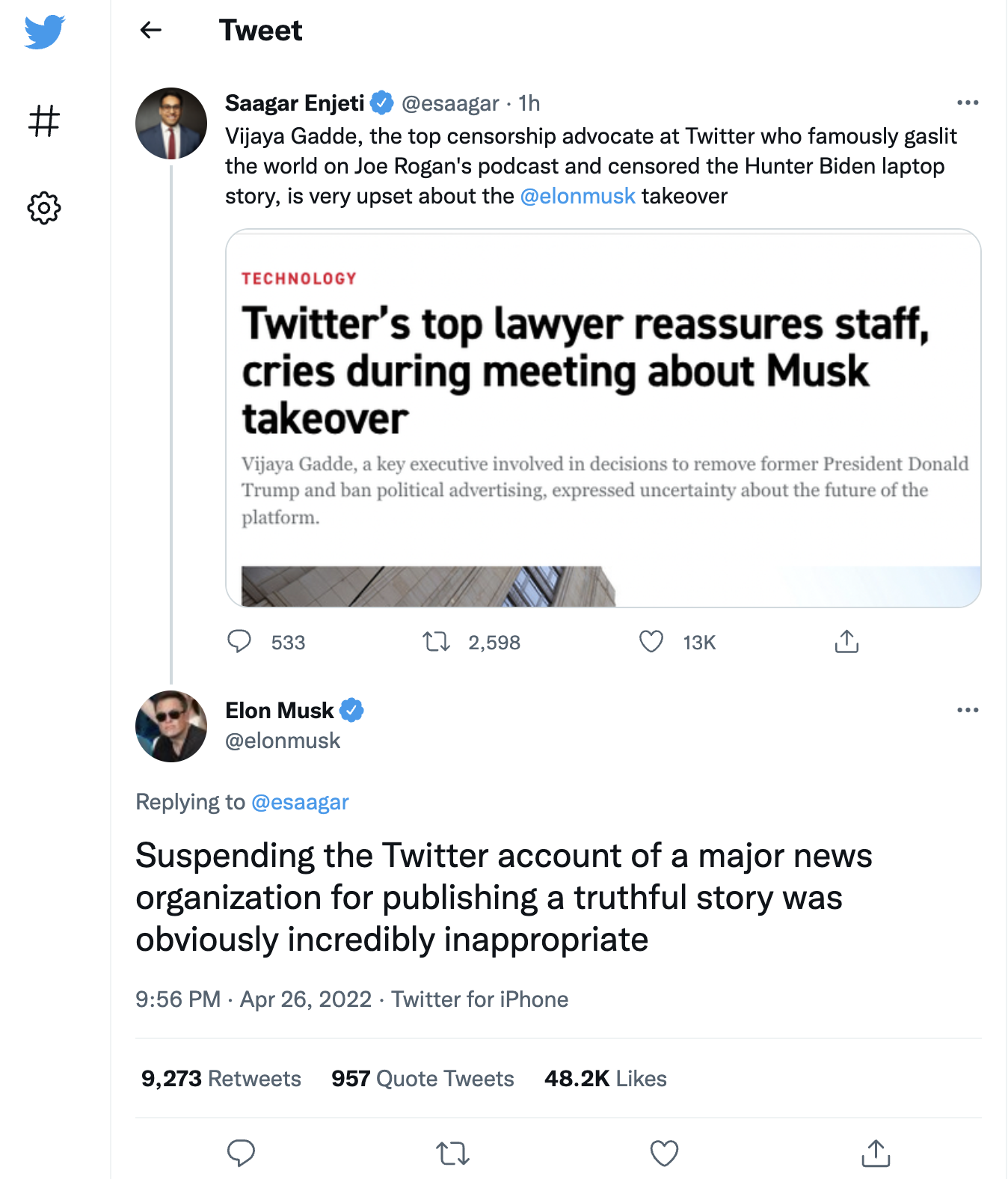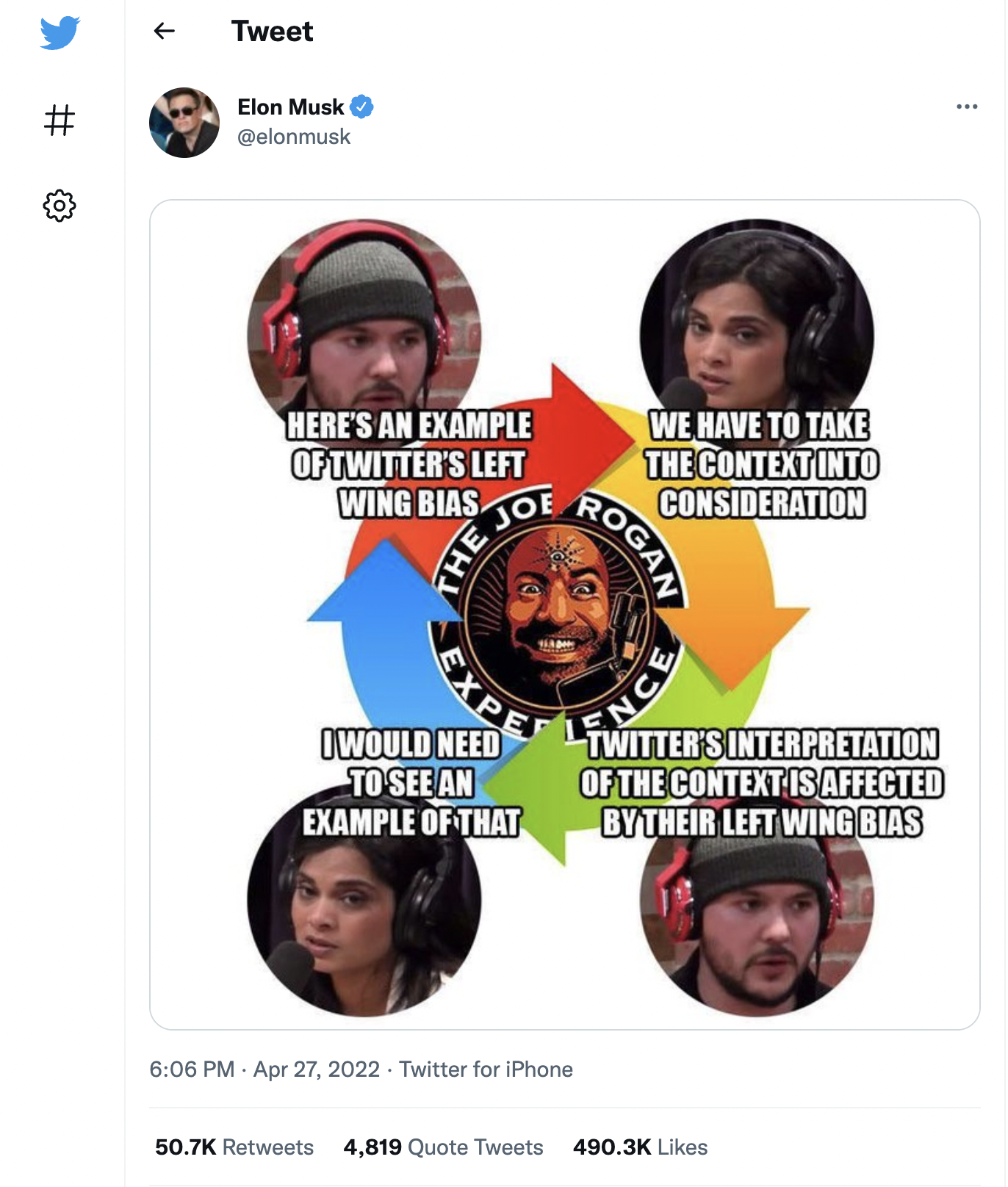Vijaya Gadde, the former General Counsel of Twitter, allegedly cried when Elon Musk offered to buy Twitter in the spring of 2022. According to reporting from Politico, Twitter spokesperson Trenton Kennedy said, "Gadde became emotional when discussing her team's impact and the pride she feels in them." Gadde was, since 2011, "the key executive charged with overseeing Twitter's trust and safety, legal and public policy functions. She is seen internally as Twitter's 'moral authority' and the executive tasked with handling sensitive issues like harassment and dangerous speech." Gadde allegedly played a key role in suppressing the New York Post's Hunter Biden laptop story in October 2020, right before the Presidential election.
 Musk Archived Tweets/https://archive.ph/KuMHo
Musk Archived Tweets/https://archive.ph/KuMHo
Musk tweeted several thoughts about Gadde's politically biased role in censoring speech on the platform. Musk posted a graphic featuring Gadde after her (and Jack Dorsey's) interview with Joe Rogan in March 2019. He was responding to a tweet by political podcaster Saagar Enjeti who stated Gadde "famously gaslit the world on Joe Rogan's podcast" when she tried to justify the decision she and others made about the laptop story. Gadde pushes the idea that "context" is important. It is why content is flagged because she believes it helps users understand what qualifies as abusive speech and what doesn't.
 Musk Archived/https://archive.ph/l0J7F
Musk Archived/https://archive.ph/l0J7F
Gadde seems to speak out of both sides of her mouth when it comes to her views of free discourse. In a 2017 NYU Law Forum discussion, she was asked to comment on the purpose of Twitter as a platform for free speech:
"I look at what Twitter means in the world and what type of conversation it's enabled. And to me, there is nothing better than having a political discourse played out in open view and having access to your elected officials. Be able to hold them accountable. So in that sense, I think it's a great thing because this wasn't always possible.
Before, the media often acted as a filter between ordinary citizens and elected officials, and now there's a direct dialogue. Now the consequences of that direct dialogue are unfolding in front of us and not something that we could have quite predicted, but one of the reasons I went to work for Twitter is because it did provide this microphone for all citizens around the world to engage on issues that are important to them."
Later in the same conversation, she discusses why Twitter isn't available in China. She says it is partly because Twitter is unwilling to do the types of things that we would need to do to be unblocked in China, one of which is "active censorship of anything political and easy access for the government and for user data." Huh, okay.
The irony is that she talks about the media filter that interferes with the dialogue between "ordinary citizens and elected officials." Still, she seems to be utterly tone-deaf regarding her role in the Twitter policies that would later serve to filter many innocent users and President Trump right off the platform.
Gadde's archived 2015 Washington Post OpEd lays bare her confusing and rather conditional belief system about free speech, especially if one really understands the animus and intent behind the First Amendment. She argues that "Twitter's mission is to give everyone the power to create and share ideas and information instantly, without barriers. This is also the essence of freedom of expression — the idea that everyone has a voice and the right to use it." However, it becomes apparent that Gadde is not reliably dedicated to free speech as it relates to the original intent. She is concerned about "abuse," bullying and hate speech.
Gadde's internal conflict seems to surface when facing the problem of "combatting abuse" on the platform. She says it is Twitter's job to "combat[ting] abuse without chilling or silencing speech." In the United States, our constitution "protects" and guarantees the freedom of speech and mentions nothing about the kinds of "contextual" or "abusive" concerns people like Gadde and others seem to espouse. Nowhere is it written in the First Amendment that hate speech should be curtailed. And yet, she says Twitter has "tripled the size of the team whose job it is to protect users," a team that has "invested heavily in tools and enforcement solutions that enable us to better detect, act on and limit the reach of abusive content."
In the end, where Gadde is concerned, it seems that free speech is no longer truly free speech. The implications of such censoring are profound because the suppression and outright banning in some cases of speech in the virtual town square have the potential to affect users' lives worldwide. As was seen with the censoring ("contextual labeling") of life-saving treatments for COVID-19 during the pandemic, millions may have died because they were prevented from seeing critical treatment options on social media platforms and the internet. The suppression of the information on Hunter Biden's laptop may well have altered the results of the 2020 election.
Gadde's Family History
Gadde reveals in her NYU interview that her early "challenging" experiences as an immigrant in the U.S. have shaped her thought process and career. According to reporting from dnaindia.com, "Gadde was born in Hyderabad, India, in 1974 to a Telugu family. But she hadn't met her father until she relocated to Texas, in the United States, at the age of three. Gadde noted that her father was a struggling graduate student in America at the time, unable to provide for his family, in a 2014 interview with Fortune."
She and her family lived in a coastal Texas town on the border of Louisiana. She explains that her father had a hard time transitioning. While he had a Master's degree, he was still relegated to selling insurance door-to-door, collecting premiums. It allegedly became threatening for him to operate as an immigrant and person of color so he made a "practical" decision to go to a local member of the KKK to ask permission to continue to conduct his business. This experience and others led Gadde to pursue a law degree. Gadde states:
"[My father] wasn't even allowed to have that job until he went to the local leader of the KKK and ask permission because his company and his boss feared for his safety as a person of color, walking around in white communities and knocking on doors."
Musk Acquires Twitter to "Free the Bird"
Musk made it clear to Twitter executives in April that he wanted to change how the social media platform handled speech. He vowed to look at the algorithms behind the suppression of speech and the banning of thousands of accounts, including President Trump's and Editor-in-Chief, Tracy Beanz, who had nearly 1 million followers at the time of her permanent suspension without notice or reason. A May 2021 UncoverDC column on Dr. Shiva's lawsuit reveals the discovery of a secret portal between Twitter and our government called the "Trusted Twitter Partnership." The portal's purpose was to allegedly help our government target and censor those who would dare to spread misinformation. Shiva discovered he was one of the targeted Twitter accounts.
The "Twitter files" being released by Elon Musk via journalist Matt Taibbi thus far only skim the surface of the clandestine forces behind the suppression of speech on the platform. It is one thing to have private companies dictating what kind of posts users see. However, witnessing our government's role in suppressing speech is quite another. I am pretty sure the real bombshells are related to how the FBI, CISA, the CDC, and other governmental agencies were the secret partners behind the "governance" of public narratives and speech on social media platforms. UncoverDC has already explored some of the governmental partnerships with nonprofits and Big Tech that have helped drive the suppression of free speech on social media. And the lawsuit being masterfully explained by Tracy Beanz is already beginning to reveal much of the real bombshell, the apparatus put into place by our government to chill and suppress speech in the most heinous ways.


